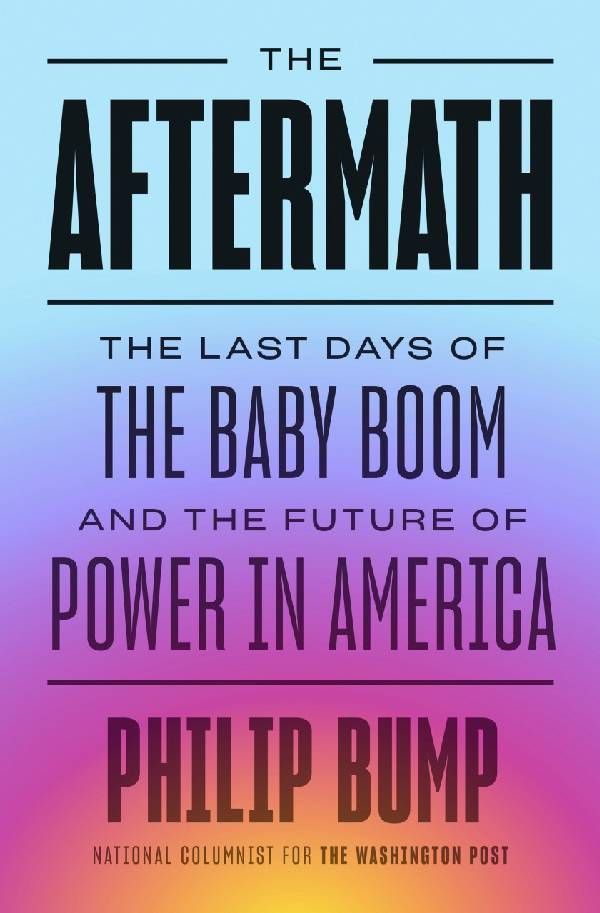America After the Baby Boom
Author Philip Bump discusses his new book’s take on the waning power of the post-World War II generation
Baby boomers' decades-long domination of the economy, power and culture in America is ending, says Washington Post columnist Philip Bump in his new book, "The Aftermath: The Last Days of the Baby Boom and the Future of Power in America."
The result, he writes, is "a historic disruption of the American Empire."

The 69.6 million U.S. boomers — down from their 78.8 million peak — were born between 1946 and 1964 and are now age 59 to 77. The generation has been surpassed in size by 72 million millennials, who are age 27 to 42 and often the boomers' kids.
Because of the boomer generation's large size relative to the country's overall population, it has long been referred to as "the pig in the python" of the nation and Bump told me during our Zoom interview that "we're now at the tail end" of that.
Intergenerational Tension
In our conversation, Bump — a Gen Xer who lives in upstate New York — shared his insights about the aftermath of the boomers' ascendancy and what this means for them as well as the rest of the country. Following are highlights of the discussion, edited for brevity and clarity:
Next Avenue: There are still nearly 70 million boomers, including me. Why did you call the book 'Aftermath?'
Philip Bump: The predicate for the book was always this generational shift from older to younger. . . . There has been this increasingly obvious tension between those two groups.
"America has to figure out how it's going to do more to take care of its increasingly large older population"
What became very apparent while working on the book was that a lot of this tension derives from the scale of the boom itself and the effect it had on the United States and on boomers themselves.
We've gotten to the point of transition that we're seeing it really is about the baby boom losing the power it accrued over the past 60 years. So, the book became a look at the aftermath of this shock to the American system.
The baby boom has at no point until now actually faced real competition for its power, both economic and political. Even Gen X (people born from 1965 to 1980) didn't compete with the boomers; there just weren't that many of us.
And the millennials?
America has to figure out how it's going to do more to take care of its increasingly large older population, but this increasingly large younger population is saying, 'Hey, we need a lot of resources, too, for child care and schools.'
A Historic Disruption Is Afoot
Why do you say we're living through a historic disruption of the American Empire?
That language is definitely grandiose, but it is the case that the United States as it exists today is a function of accommodating the baby boom. America's decision makers have for a long time been responsive to the scale of the baby boom — marketers, politicians, everybody. Now, we are seeing the baby boom's grip on the direction of the United States lessen.
What's going on from the standpoint of a power structure and why?
For political power, Congress is a good metric. The average age in Congress, which had increased steadily along with the age of the baby boomers, is starting to dip back down. You see the Democratic party make the decision to overhaul its leadership to be younger as a symbolic manifestation of the shift in generational power.
You see a very real transition of economic power in the sense of institutions that bolster young Americans
The cultural power of the baby boom is still very, very robust; Bruce Springsteen is back on tour, for God's sake. But at the same time, it's nostalgia based, as opposed to innovation, to a large extent.
Boomers' Greatest Hits
If you were going to tick off the most significant positive impacts of the boomer generation, what would they be?
The baby boom helped propel American economic growth. The baby boom was good at pushing back on archaic institutions which led to negative outcomes, like the military industrial complex and Vietnam War. When the baby boom emerged, the civil rights fight was largely over, but it required tending and I think the boom was good at ensuring that those advancements were retained.
The thing that confuses me about the 'OK boomer' phenomenon is that the boomer generation has, by and large, a very good relationship with its kids and vice versa.
There are real reasons why younger Americans feel frustrated. And it's not because older Americans collectively take actions disadvantaging younger people.
"There are real reasons why younger Americans feel frustrated. And it's not because older Americans collectively take actions disadvantaging younger people."
Older Americans are more likely to own homes and are going to try and protect the value of their homes because they see that as a storehouse of wealth they are going to need in retirement.
So, when a city wants to build a big apartment building, [the older people] say; 'You know what? I'd rather not do that because it's going to decrease my home value.' When you have a lot of that happening, it makes it harder for younger people to own a home, even in an apartment building.
And so, there's hostility. It contributes to this sense that the older generation is standing as a blockade against the younger generation when it's not intentional. It's just an aftereffect of the way the system works.
Now we're at this point where because of all these births in 1946 to 1964, we necessarily have to put a lot of resources into what's happening with older Americans. You can see why it's frustrating to younger Americans as a result.
Imagining the Aftermath
When I was reading the book, I felt like you were saying there were some things we know about what the aftermath of boomers is going to mean, there are some things we have a pretty good idea about and some it's impossible to predict. Can you talk about each?
There's very little that we know with certainty. We know that the population of older Americans is going to continue to grow as a percentage of the population over time, barring a shock like COVID.
We know that the Census Bureau expects American demography to grow more diverse, but there are a lot of caveats to that. Younger Americans look different and have different cultural values and backgrounds than older Americans; that contributes to a lot of cultural and political tension.
We don't know what the full effect of climate change is going to be. We know it's going to affect where people want to, and can, buy property. But we don't know what the scale of that looks like.
The Cost of Living Longer
We don't know how long people are going to live. And that's important from an economic standpoint, because if you live to be 105, you're going to spend the last 15 years of your life presumably requiring more care than when you were 30. That costs a lot of money. So, if you have a lot of money now, but then you live that long, you'll have less money to leave to your kids.
One thing that surprised me in your book was the importance of boomer women in leading the resistance in America. Can you talk about that?
This is one of the ways in which the baby boom is maligned by younger Americans often unfairly; it's seen as arch conservative in a lot of ways.
Baby boomers make up a larger percentage of the Republican party than the Democratic party, which I think fosters this perception. But when you look at the backlash to Donald Trump, the immediate response from November 2016 into his presidency, that was really led by an aggregation primarily of older women with college degrees who were speaking out against Donald Trump and reacting forcefully to his politics and particularly his gender politics.
Boomers Are Not All Alike
It's a reminder that the boomer generation isn't homogenous.
One question you raise in the book is whether boomers are disproportionately wealthy and powerful? Are they?
In the aggregate, they have a collective enormous amount of wealth, but there's an enormous number of them. When you do the division, it sort of lands where you would expect.
"Every generation has a broad reputation that is in some ways deserved, in some ways not."
I think this topic fuels some of that generational tension, because younger people are like, 'Look at these wealthy boomers who own their homes, yada, yada, yada.' And the individual boomers respond, 'What are you talking about? I'm not wealthy. I'm scraping to get by, trying to afford my mortgage.'
Of course, when you layer wealth inequality on top, you have a number of boomers who are extraordinarily wealthy, and they add to this cumulative wealth total for the boomers. But then you have a lot of baby boomers who aren't wealthy at all.
Reshaping Retirement
How are boomers redefining retirement?
Boomers who are reaching retirement age are engaging in the workforce in a way that wasn't necessarily the case previously.
There are also a lot of people over 50 who say that age discrimination is keeping them from getting jobs.
There's no question.
Social Security and Medicare are facing solvency problems in the coming years. What's the boomers' connection to that?
There was a huge influx of money into Social Security over the several past decades that now is being drawn down on as boomers are retiring. The question is: Will there be the level of support that people expect and are requiring for their retirement from Social Security?
A Shift on Social Programs
The party that has long been concerned about cutting down spending on Social Security and Medicare has been the Republican party. But the Republican party is now a quarter of people who are of retirement age, much more so than the Democratic party.
So, if you use Fox News as an indicator, Fox News has been talking a lot less about those things in recent years, in part because baby boomers are a large part of the Fox News audience and are going to use these systems in short order.
I think it's likely that the very nature of the Republican party will help inspire it to potentially take a different approach.
Boomer No. 1
You met with Kathleen Casey Kirschling, described as the first baby boomer because she was born on January 1, 1946. I felt like she was apologizing for the baby boom generation and also raising concerns about prospects for the millennials. Am I right?

You are. She's fairly liberal, not hard left; she's a fervent Catholic. I think she does see ways in which America has changed for the worse and for which baby boomers and older Americans can be blamed potentially. So, I think she feels some actual guilt for that.
But she's also very self-aware and probably aware that she's a representative of the baby boom generation and that a lot of younger Americans feel frustrated with them.
She has a house in New Jersey and a house in Florida where she winters. She has that sort of idealized life and I think recognizes that's not as accessible to her kids and their grandkids.
As a Gen Xer, how do you feel about the baby boom generation?
I mean, it's my parents. My parents are both born in '48. Being Gen X is useful here because it allows me to be somewhat clear-eyed about both the boomers and younger people.
Every generation has a broad reputation that is in some ways deserved, in some ways not.


